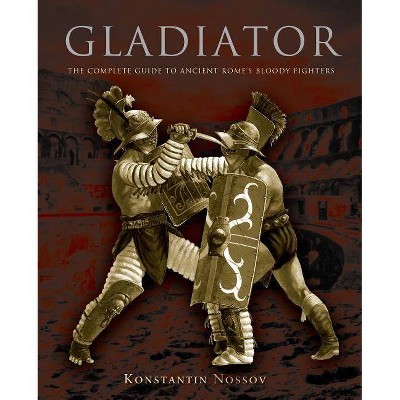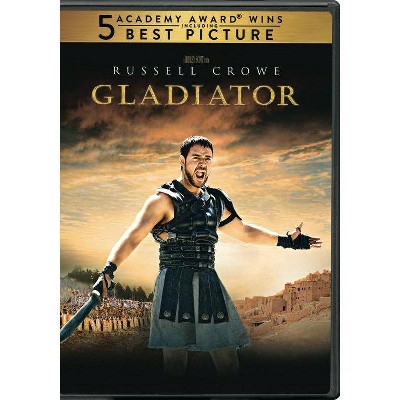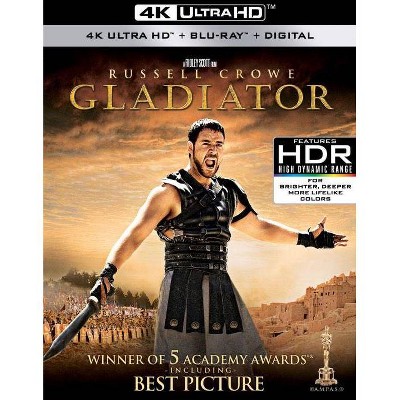Gladiator - by Martin M Winkler (Paperback)

Similar Products
Products of same category from the store
AllProduct info
<p/><br></br><p><b> Book Synopsis </b></p></br></br>This is the first book to analyze Ridley Scott's film <i>Gladiator</i> from historical, cultural, and cinematic perspectives. <br /> <ul> <br /> </li> <li>The first systematic analysis of Ridley Scott's film, <i>Gladiator.</i><br /> </li> <li>Examines the film's presentation of Roman history and culture.<br /> </li> <li>Considers its cinematic origins and traditions.<br /> </li> <li>Draws out the film's modern social and political overtones.<br /> </li> <li>Includes relevant ancient sources in translation.</li> </ul><p/><br></br><p><b> From the Back Cover </b></p></br></br>Ridley Scott's <i>Gladiator</i> was the first epic film on a Roman subject in 35 years and generated a far-reaching renewal of interest in Roman history and culture. This book analyzes <i>Gladiator</i> from historical, cultural, and cinematic perspectives.<br /> <p>It comprises ten essays by experts, examining the film as a representation of history and as cinema. Subjects covered include Roman history and gladiatorial combat, the cinematic origins and traditions of <i>Gladiator</i>, and the film's modern social and political overtones. The book also includes translations of the film's most important historical sources.</p><p/><br></br><p><b> Review Quotes </b></p></br></br><br>Invaluable. <i>Times Literary Supplement</i><br /> <p>A most welcome addition to this rapidly expanding discourse. It succeeds in collecting an insightful and diverse set of reflections 'inspired by' Gladiator (as filmmakers might say) and will hopefully encourage similar explorations of more recent and forthcoming films set in antiquity. <i>Bryn Mawr Classical Review</i><br /> </p> <p><br /> </p> <p>This book provides a very useful resource that will enhance the analytical sophistication of students of Scott's film and one that will deepen their appreciation of the complexity of Roman society in the reign of Commodus as well as the problem of imperialism then and today. I have no doubt that it will be a great success and a distinct credit to its editor and his contributors. <i>Scholia</i><br /> </p> <p><br /> </p> <p><i></i>Martin Winkler is one of the pioneers in the use of film as applied to classical antiquity. <i>New England Classical Journal</i><br /> </p> <p><br /> </p> <p>Winkler has created an unlikely meeting of brains and brawn in this collection of papers from classicists who contemplate the popularity of Ridley Scott's film <i>Gladiator. Reference and Research Book News</i><br /> </p> <p>Martin Winkler has brought together classicists who understand and respect the power of modern film. This volume will set the standard for the serious study of the reflections and influence of the classical world on contemporary popular culture. <i>Gregory N. Daugherty, Randolph-Macon College</i><br /> </p> <p>Boasting its own triumphant array of stimulating double takes on the film <i>Gladiator</i>, this book successfully recaptures the excitement and immediacy of the turn of the 21st century cinematic epic. <i>Paula James, The Open University</i><br /> </p> <p>A promising model of the multiple approaches that may be taken to a single cinematic text ... Its demonstration that even highly commercial products of popular culture can still yield serious insights and analysis can only benefit the study of classics and cinema. <i>Journal of Roman Studies</i></p><br><p/><br></br><p><b> About the Author </b></p></br></br><b>Martin M. Winkler</b> is Professor of Classics at George Mason University, Virginia, U.S.A. He is the editor, most recently, of <i>Juvenal in English</i> (2001) and <i>Classical Myth and Culture in the Cinema</i> (2001). He has also published articles on Roman literature, the classical tradition, and on classical and medieval culture and mythology in film.
Price History
Price Archive shows prices from various stores, lets you see history and find the cheapest. There is no actual sale on the website. For all support, inquiry and suggestion messagescommunication@pricearchive.us



















